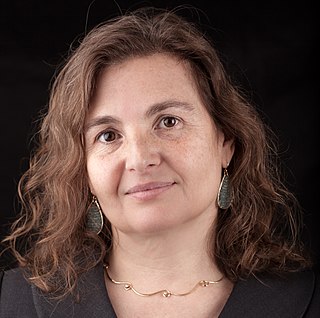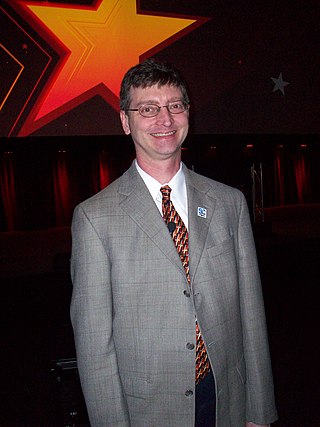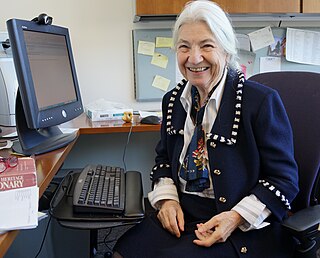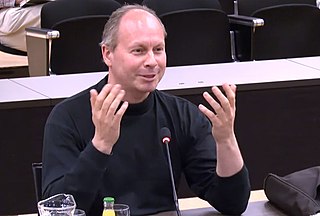Related Research Articles

Andrew Stuart Tanenbaum, sometimes referred to by the handle ast, is an American computer scientist and professor emeritus of computer science at the Vrije Universiteit Amsterdam in the Netherlands.
Software engineering is an engineering approach to software development. A practitioner, called a software engineer, applies the engineering design process to develop software.

The Vrije Universiteit Amsterdam is a public research university in Amsterdam, Netherlands, being founded in 1880. The VU Amsterdam is one of two large, publicly funded research universities in the city, the other being the University of Amsterdam (UvA). The literal translation of the Dutch name Vrije Universiteit is "Free University". "Free" refers to independence of the university from both the State and the Dutch Reformed Church. Both within and outside the university, the institution is commonly referred to as "the VU". Although founded as a private institution, the VU has received government funding on a parity basis with public universities since 1970. The university is located on a compact urban campus in the southern Buitenveldert neighbourhood of Amsterdam and adjacent to the modern Zuidas business district.

Jack Joseph Dongarra is an American computer scientist and mathematician. He is a University Distinguished Professor Emeritus of Computer Science in the Electrical Engineering and Computer Science Department at the University of Tennessee. He holds the position of a Distinguished Research Staff member in the Computer Science and Mathematics Division at Oak Ridge National Laboratory, Turing Fellowship in the School of Mathematics at the University of Manchester, and is an adjunct professor and teacher in the Computer Science Department at Rice University. He served as a faculty fellow at the Texas A&M University Institute for Advanced Study (2014–2018). Dongarra is the founding director of the Innovative Computing Laboratory at the University of Tennessee. He was the recipient of the Turing Award in 2021.
Neuroinformatics is the emergent field that combines informatics and neuroscience. Neuroinformatics is related with neuroscience data and information processing by artificial neural networks. There are three main directions where neuroinformatics has to be applied:

Science, technology, engineering, and mathematics (STEM) is an umbrella term used to group together the distinct but related technical disciplines of science, technology, engineering, and mathematics. The term is typically used in the context of education policy or curriculum choices in schools. It has implications for workforce development, national security concerns, and immigration policy, with regard to admitting foreign students and tech workers.
Amsterdam University of Applied Sciences is a large vocational university located in Amsterdam, Netherlands. The AUAS mainly offers bachelor's degree programmes, but also has a number of (professional) master's degree programmes. For students from the AUAS' international partner institutes it is possible to study at the AUAS as an exchange student.

Daniela L. Rus is a roboticist and computer scientist, Director of the MIT Computer Science and Artificial Intelligence Laboratory (CSAIL), and the Andrew and Erna Viterbi Professor in the Department of Electrical Engineering and Computer Science (EECS) at the Massachusetts Institute of Technology. She is the author of the books Computing the Future and The Heart and the Chip.

Amsterdam University College (AUC) is a public liberal arts college in the Netherlands with an enrollment of about 900 students from more than 60 countries. All teaching is in English.

William Douglas Gropp is the director of the National Center for Supercomputing Applications (NCSA) and the Thomas M. Siebel Chair in the Department of Computer Science at the University of Illinois at Urbana–Champaign. He is also the founding Director of the Parallel Computing Institute. Gropp helped to create the Message Passing Interface, also known as MPI, and the Portable, Extensible Toolkit for Scientific Computation, also known as PETSc.

Ruzena Bajcsy is an American engineer and computer scientist who specializes in robotics. She is professor of electrical engineering and computer sciences at the University of California, Berkeley, where she is also director emerita of CITRIS.

Yann André LeCun is a French-American computer scientist working primarily in the fields of machine learning, computer vision, mobile robotics and computational neuroscience. He is the Silver Professor of the Courant Institute of Mathematical Sciences at New York University and Vice-President, Chief AI Scientist at Meta.
The Sidney Fernbach Award established in 1992 by the IEEE Computer Society, in memory of Sidney Fernbach, one of the pioneers in the development and application of high performance computers for the solution of large computational problems as the Division Chief for the Computation Division at Lawrence Livermore Laboratory from the late 1950s through the 1970s. A certificate and $2,000 are awarded for outstanding contributions in the application of high performance computers using innovative approaches. The nomination deadline is 1 July each year.

Kathleen M. Carley is an American computational social scientist specializing in dynamic network analysis. She is a professor in the School of Computer Science in the Carnegie Mellon Institute for Software Research at Carnegie Mellon University and also holds appointments in the Tepper School of Business, the Heinz College, the Department of Engineering and Public Policy, and the Department of Social and Decision Sciences.
Lydia E. Kavraki is a Greek-American computer scientist, the Noah Harding Professor of Computer Science, a professor of bioengineering, electrical and computer engineering, and mechanical engineering at Rice University. She is also the director of the Ken Kennedy Institute at Rice University. She is known for her work on robotics/AI and bioinformatics/computational biology and in particular for the probabilistic roadmap method for robot motion planning and biomolecular configuration analysis.
Marsha J. Berger is an American computer scientist. Her areas of research include numerical analysis, computational fluid dynamics, and high-performance parallel computing. She is a Silver Professor (emeritus) of Computer Science and Mathematics in the Courant Institute of Mathematical Sciences of New York University. She is Group Leader of Modeling and Simulation in the Center for Computational Mathematics at the Flatiron Institute.

Christopher (Chris) Verhoef is a Dutch computer scientist, and Professor of Computer Science at the Vrije Universiteit in Amsterdam.

Fei-Fei Li is a Chinese-American computer scientist, known for establishing ImageNet, the dataset that enabled rapid advances in computer vision in the 2010s. She is the Sequoia Capital professor of computer science at Stanford University and former board director at Twitter. Li is a co-director of the Stanford Institute for Human-Centered Artificial Intelligence and a co-director of the Stanford Vision and Learning Lab. She served as the director of the Stanford Artificial Intelligence Laboratory from 2013 to 2018.
Tamara Macushla Munzner is an American-Canadian scientist. She is an expert in information visualization who works as a professor of computer science at the University of British Columbia (UBC).

Ilkay Altintas is a Turkish-American data and computer scientist, and researcher in the domain of supercomputing and high-performance computing applications. Since 2015, Altintas has served as chief data science officer of the San Diego Supercomputer Center (SDSC), at the University of California, San Diego (UCSD), where she has also served as founder and director of the Workflows for Data Science Center of Excellence (WorDS) since 2014, as well as founder and director of the WIFIRE lab. Altintas is also the co-initiator of the Kepler scientific workflow system, an open-source platform that endows research scientists with the ability to readily collaborate, share, and design scientific workflows.
References
- ↑ "ISNI 0000000387516984 Bakhshi, R. ( 1981- )". isni.oclc.org. Retrieved 2023-09-21.
- 1 2 3 "Dr. Rena Bakhshi". eScience Center. Retrieved 2023-09-21.
- ↑ "IEEE Explore". IEEE . Retrieved 2023-09-21.
- ↑ "Rena Bakhshi - The Mathematics Genealogy Project". www.mathgenealogy.org. Retrieved 2023-09-21.
- ↑ "MathSciNet". mathscinet.ams.org. Retrieved 2023-09-21.
- ↑ "Researchgate Rena-Bakhshi". Researchgate. Retrieved 2023-09-21.